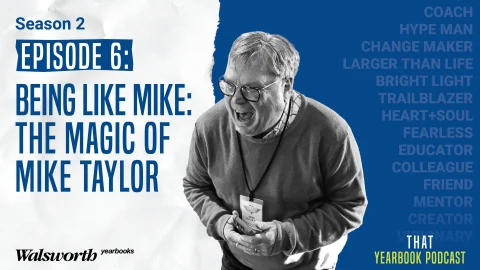Casey Nichols usually does not have time to attend the regular faculty meetings at his school. As the yearbook adviser and chair of the communications department at Rocklin High School in Rocklin, Calif., Nichols is a busy man.
One particular Wednesday afternoon this past December was no different. Rocklin’s principal, Debra Hawkins, called for her regular short staff meeting to make a couple important announcements.
Even though it was a busy deadline week for the yearbook, Nichols bucked his normal trend and decided to attend. Nichols said he could not exactly explain why he chose to attend, instead of bearing down on yearbook business the way he normally does.
“When I got into the meeting, the principal said this wasn’t actually a staff meeting, we were there to honor one of our own,” said Nichols. “I thought to myself, ‘oh, isn’t that nice.’ Then I turned and looked into the corner and I knew what it was all about.”
When Nichols glanced around the room, he saw H.L. Hall, former president of the Journalism Education Association, and Linda Puntney, the JEA’s executive director. Another look to the side and Nichols spotted his parents. At that moment, he knew why the Rocklin faculty had gathered. Nichols had been chosen as the JEA’s 2004 National Yearbook Adviser of the Year.
“It was really the furthest thing from my mind,” said Nichols. “When I saw H.L. Hall, I knew what it was about. I think I cried for about 20 minutes.”
Indeed, as Hall recalls that day, the presentation became a poignant and emotional moment for Nichols, a man who has devoted his entire career to journalism and the past 23 years to scholastic journalism.
“I’ve never seen somebody as surprised as Casey was,” said Hall, a retired yearbook adviser, who won the first Adviser of the Year award in 1995. “When he started crying, it was difficult for me to keep from crying.”
For Nichols, it was a sweet moment, complete with a standing ovation from his fellow teachers at Rocklin. Considering Nichols’ normal habit of skipping faculty meetings, it even seemed to be a moment guided by fate. Which makes sense, considering that fate might have been the force that guided Nichols to his life calling in the first place.
Meant to be
Nichols uses one word to describe how he entered journalism. It happened when he was a sophomore in high school. “Serendipity,” said Nichols. “I desperately wanted out of German 2, and the only class open was journalism.”
What spawned from a 16-year old’s fear of tackling a foreign language quickly turned into a career path. Nichols did well enough working on his high school’s publications that he soon got a summer job working as a stringer for the sports staff of his local hometown newspaper, the Roseville Press-Tribune.
The part-time job led to a summer internship on the sports staff after Nichols finished his senior year of high school. Once again, fate stepped in.
“On the first of August that summer, the sports editor quit,” said Nichols. “So they hired me to be sports editor.”
For the next seven years, Nichols stayed on as the sports editor of the Press-Tribune. The small, 10,000-circulation daily allowed Nichols to learn just about everything there is to learn about print journalism. Practically a one-man sports staff, Nichols wrote and edited stories, took photos and designed the sports section each day.
“In that kind of situation, you learn to do it all,” said Nichols. “My experience helped me later in life as a teacher. Journalists have to be very quick on their feet and very adaptable. We used to do swing shifts where one other guy and I were cranking out 20 stories a day. Working on deadline doesn’t faze me.”
Born to teach
Despite his success in newspapers, Nichols had other ambitions. His goal was to become a primary school teacher, so he went back to school full time. He earned his bachelor’s degree from California State University-Sacramento, and then his master’s degree in journalism from Ball State University in Muncie, Ind.
While studying at Ball State, Nichols became fascinated by yearbook production. His first experience as an adviser came when he helped produce a book for the Burris Lab School at Ball State.
“My first love was history, which is what my training as a teacher was in. I loved the historic aspect of yearbook and the permanence,” said Nichols. “I also enjoyed the high-end printing.”
Hall met Nichols at Ball State, when he came to Muncie to teach a summer workshop while Nichols was a student. Nichols was immediately impressed by the long-time yearbook teacher, and Hall returned the sentiments.
“He was a St. Louis Cardinals baseball fan, so I knew he had to be a great guy,” joked Hall. “Generally you knew anybody trained at Ball State was going to be good, and I could tell he was going to be an up-and-comer.
” With his education complete, Nichols returned home to California, where he took a position teaching English and math, coaching basketball, and advising yearbook for his own junior high alma mater, Eich Intermediate School in Roseville.
Nichols spent 11 years at Eich, and developed the journalism program, creating photography and video classes. He also became actively involved in both the national and state scholastic journalism organizations, serving on boards and becoming one of the most well-regarded junior high advisers in the country.
However, after more than a decade, Nichols knew he needed a new opportunity.
“I felt like I had sort of done everything I could do at the junior high level,” said Nichols. “I needed a personal change, and I needed the challenge of a high school program.”
New challenges
In 1994, Nichols made what has turned out to be the most successful move of his career when he took the position with Rocklin High, a new school that was entering only its second year in existence.
“I fell into the perfect job,” said Nichols. “I really got to build the program very much in the vision of what I thought a program should be.”
Since Rocklin was a new school, Nichols started the foundation of the communications department with bare bones. In the beginning, the entire department was just one journalism class and one class to produce the Rocklin yearbook, Tonitrus. The first yearbook staff included just seven students, none older than a sophomore.
Those numbers soon grew over the next several years. Under the guidance of Nichols, Rocklin’s communications department is now the largest elective department in the school, including three publications classes, photojournalism and a graphics class.
But Nichols’ first love continued to be yearbook, which he still teaches today. The annual process of getting new students involved in journalism still gives Nichols the same charge that it did more than 20 years ago.
“I think every student needs a reason to come to school. It could be that they love Calculus, but I think many need an extra-curricular activity of some kind,” said Nichols. “I’ve tried to create a niche that kids want to buy into, a really positive place.”
The Tonitrus itself has garnered recognition from the national Crown and Pacemaker Awards, but prides itself on not emphasizing outside recognition. Each year, the yearbook staff is taught to focus strictly on the wants of their own student body.
“We are a very reader-driven book. Because of that, our book is sometimes overwhelming for people who aren’t teenagers. We cover a ton of things, and a ton of people,” said Nichols. “Our mission statement in yearbook is by kids, for kids and about kids.”
The focus on reflecting the current youth culture, and not sweating the traditional components favored by yearbook judges has not always led to positive critiques. But it has almost always led to rave reviews from the Rocklin students.
“The yearbook is only as good as the individual buyer thinks it is,” said Nichols. “We don’t judge ourselves on national standards, and we don’t judge ourselves on awards. We’re trying to capture the moment for kids that are here now.”
As the principal at Rocklin for the past five years, Debra Hawkins has observed Nichols’ ability to communicate with students and create an original yearbook each year that never seems to lag in sales.
“He’s willing to take risks and make the yearbook cutting edge, but as a principal, I never have to worry about what they’re doing,” said Hawkins. “He’s developed a culture with the yearbook kids that it’s good to be forward-thinking, but responsible and professional at the same time.”
Leaving a legacy
Even after successfully building the journalism program at Rocklin, and winning the JEA’s Yearbook Adviser of the Year award, Nichols chuckles when asked about what legacy he will leave behind when his career ends.
The idea of a legacy is the kind of lofty thinking that Nichols said he has never really done. However, he does have an answer for how he would like to be remembered.
“I come to work with the philosophy that I’m going to make some kid’s life better today,” said Nichols. “I’ve tried to help students and peers have a more interesting, more rewarding life.”
Nichols has no plans to retire or leave Rocklin anytime soon. As he puts it, he is not one of those teachers that is “counting down the days to retirement.”
The past couple years have even given Nichols perspective away from school. His 26-year old daughter, Kinzie, gave birth to her first daughter, Alyssa, 18 months ago, making Nichols a grandpa for the first time at age 50.
Life as a grandpa now takes up quite a bit of Nichols’ spare time, as do his beloved Sacramento Kings of the NBA, of which Nichols is a season ticket holder. Like many trained journalists, Nichols loves the printed word and he reads as much as he can. He recently finished reading the novel The Time Traveler’s Wife.
If Nichols does indeed have a legacy that he will eventually leave behind, Hall might have given insight to it at the JEA’s recent surprise award ceremony. Hall crafted a poem about Nichols, based off the famous Dr. Seuss book, “Oh, the thinks you can think.”
Hall followed the classic Seuss structure, but filled in his own words to describe the years of service that Nichols has devoted to his students. Summed up in the last line, Hall’s poem simply said, “That Casey Nichols. He’s a mighty nice guy.”



